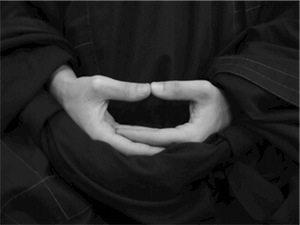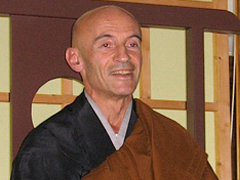
The word Zen means silent meditation (zen in Japanese, chan in Chinese and dhyâna in sanscrit).
It defines one of the main schools of Mahâyâna Buddhism from Japan (sôtô Zen school) which favors the practice of sitting meditation going back to the experience of the Buddha Shakyamuni who, two thousand five hundred years ago, realized awakening.
This practice contains the essence of its teaching, whose message is carried universally.
It is called zazen or shikantaza, and essentially consists of “just sitting”, “simply sitting” facing the wall. It is not based on any dogma or ideology. Simply knowing texts is insufficient for understanding Zen.
Continue Reading
Print
Email
 Sit on the zafu (cushion) cross legged. In lotus position, put your right foot on the left thigh and bring the left foot up onto the right thigh. In half-lotus, put your right foot on the left thigh and alternate. The weight of the body is placed on three points: the knees pushing against the ground and the perennial muscle which presses against the zafu. The spine is straight and vertical. The back is flexed, and the shoulders are relaxed. The chin is tucked in, the back of the neck is stretched. Push the top of your head up towards the sky. The mouth is closed and the tongue touches the upper palate and the inside of the two front teeth. This calms “interior chatting”. The eyes are semi- closed and look down towards the ground, about one meter in front, without looking at anything in particular.
Sit on the zafu (cushion) cross legged. In lotus position, put your right foot on the left thigh and bring the left foot up onto the right thigh. In half-lotus, put your right foot on the left thigh and alternate. The weight of the body is placed on three points: the knees pushing against the ground and the perennial muscle which presses against the zafu. The spine is straight and vertical. The back is flexed, and the shoulders are relaxed. The chin is tucked in, the back of the neck is stretched. Push the top of your head up towards the sky. The mouth is closed and the tongue touches the upper palate and the inside of the two front teeth. This calms “interior chatting”. The eyes are semi- closed and look down towards the ground, about one meter in front, without looking at anything in particular.
Continue Reading
Print
Email
 Born in 1944, Master Roland Yuno Rech graduated from the Institute of Political Science in Paris (Science Po) and received a graduate degree in Clinical Psychology from the University of Paris VII. At the end of a trip around the world, he discovered the Zen practice in a temple in Kyoto and decided to return to France to study the teachings of Master Deshimaru. He was his disciple from 1972 until 1982 when Master Deshimaru died. Following his Master’s recommendations, he went back to working in an industrial field, which was an opportunity for him to experiment with the practice of Zen in daily life, within an economic and social environment. When his Master died in 1982, he dedicated his activities mainly to the practice and teaching of Zen and was president of the International Zen Association (AZI) until1994.
Born in 1944, Master Roland Yuno Rech graduated from the Institute of Political Science in Paris (Science Po) and received a graduate degree in Clinical Psychology from the University of Paris VII. At the end of a trip around the world, he discovered the Zen practice in a temple in Kyoto and decided to return to France to study the teachings of Master Deshimaru. He was his disciple from 1972 until 1982 when Master Deshimaru died. Following his Master’s recommendations, he went back to working in an industrial field, which was an opportunity for him to experiment with the practice of Zen in daily life, within an economic and social environment. When his Master died in 1982, he dedicated his activities mainly to the practice and teaching of Zen and was president of the International Zen Association (AZI) until1994.
Continue Reading
Print
Email








 Sit on the zafu (cushion) cross legged. In lotus position, put your right foot on the left thigh and bring the left foot up onto the right thigh. In half-lotus, put your right foot on the left thigh and alternate. The weight of the body is placed on three points: the knees pushing against the ground and the perennial muscle which presses against the zafu. The spine is straight and vertical. The back is flexed, and the shoulders are relaxed. The chin is tucked in, the back of the neck is stretched. Push the top of your head up towards the sky. The mouth is closed and the tongue touches the upper palate and the inside of the two front teeth. This calms “interior chatting”. The eyes are semi- closed and look down towards the ground, about one meter in front, without looking at anything in particular.
Sit on the zafu (cushion) cross legged. In lotus position, put your right foot on the left thigh and bring the left foot up onto the right thigh. In half-lotus, put your right foot on the left thigh and alternate. The weight of the body is placed on three points: the knees pushing against the ground and the perennial muscle which presses against the zafu. The spine is straight and vertical. The back is flexed, and the shoulders are relaxed. The chin is tucked in, the back of the neck is stretched. Push the top of your head up towards the sky. The mouth is closed and the tongue touches the upper palate and the inside of the two front teeth. This calms “interior chatting”. The eyes are semi- closed and look down towards the ground, about one meter in front, without looking at anything in particular. Born in 1944, Master Roland Yuno Rech graduated from the Institute of Political Science in Paris (Science Po) and received a graduate degree in Clinical Psychology from the University of Paris VII. At the end of a trip around the world, he discovered the Zen practice in a temple in Kyoto and decided to return to France to study the teachings of Master Deshimaru. He was his disciple from 1972 until 1982 when Master Deshimaru died. Following his Master’s recommendations, he went back to working in an industrial field, which was an opportunity for him to experiment with the practice of Zen in daily life, within an economic and social environment. When his Master died in 1982, he dedicated his activities mainly to the practice and teaching of Zen and was president of the International Zen Association (AZI) until1994.
Born in 1944, Master Roland Yuno Rech graduated from the Institute of Political Science in Paris (Science Po) and received a graduate degree in Clinical Psychology from the University of Paris VII. At the end of a trip around the world, he discovered the Zen practice in a temple in Kyoto and decided to return to France to study the teachings of Master Deshimaru. He was his disciple from 1972 until 1982 when Master Deshimaru died. Following his Master’s recommendations, he went back to working in an industrial field, which was an opportunity for him to experiment with the practice of Zen in daily life, within an economic and social environment. When his Master died in 1982, he dedicated his activities mainly to the practice and teaching of Zen and was president of the International Zen Association (AZI) until1994.